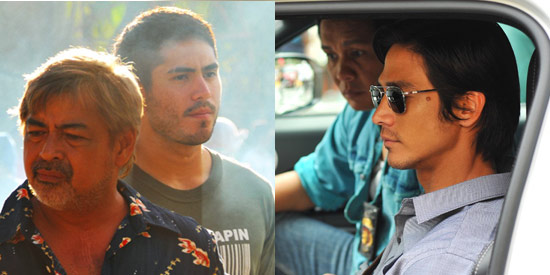There are plenty of plot twists and turns that unfold in this crime thriller, which (according to its preface) is a�?inspired by true events.a�?A�OTJA�depicts how prisoners are used as hitmen to take down enemies of the powerful and moneyeda��with the former driven by need and the latter, by greed.
Erik Mattia��s latest film opens much like a Hong Kong gangster flick, with the merrymaking of a�?basaana�? during the City of San Juana��s fiesta taking the place of Chinese celebrations on the streets of the HK harbour. Moviegoers immediately meet Daniel (Gerald Anderson) and a�?Tatanga�? Mario (Joel Torre), two unlikely companions whoa��we eventually learna��are simply fulfilling a job. As a�?Tatanga�? nears his retirement as an assassin, he prepares the cocky Daniel to become a cold-blooded killer.
On the other side of the law are SPO1 Joaquin Acosta (Joey Marquez) and NBI Agent Atty. Francis Coronel (Piolo Pascual). Under the tutelage of his father-in-law Congressman Manrique (played by Michael de Mesa), the hotshot lawyer learns the art of compromising in the world of politics.
The mentor-protA�gA� relationship between Mario and Daniel as well as Joaquin and Francis remind me of the relationship of the characters in the American movieA�Training Day, where the young, bright-eyed rookie cop is initiated into the filthier side of being a police officer by his seasoned partner. The sequence inA�OTJA�where the scenes shift from conversations between a�?Tatanga�? Mario and Daniel to those of Francis and his father-in-law are rhythmic, like a well-sustained tennis match with each mentor dishing out nuggets of wisdom to his student.
I cannot help but compare it toA�Manila By Night, not only because Manilaa��s streets andA�eskenitasA�(side streets) figure prominently in the movie, but also because the story reminds me of Lino Brockaa��s characters in their complexity: their desperation, their capacity for violence, and their humanity that lets a glimmer of light shine through somehow.
Piolo Pascual had the difficult job of communicating the moral dilemma of his character: choosing to protect his family or choosing to fulfil his duty as a law enforcer. Piolo holds his own, but with a consistently excellent ensemble, his acting pales in comparison. Joel Torre (who won Best Actor in a Korean film festival) brings life to a likable villain or at least one for whom we empathize with because his struggles and dilemmas are not so distant from our own.
Gerald Anderson drops his heartthrob and teenybopper image to prove that he is a good actor who communicates emotions using his eyes, drawing viewers in with their gut-wrenching authenticity.
I did not think Joey Marquez could pull off being a straight cop, but he takes us on a rollercoaster ride of conflicting emotions that subtly cross his face. His comic timing is also put to good use in this movie.
Michael de Mesa (as Congressman Manrique) and Leo Martinez (as General Pacheco) are spot-on in their personifications of powerful yet sinister politicians and military men.
Not to discount the women, Angel Aquino does not disappoint, with her very believable and tempered performance as Marioa��s wife. Empress Schuck shows admirable maturity as she resists overacting, especially during her very emotional scenes. Even Rosanna Roces (as the wife of Joey Marquez) makes a powerful impression in her few scenes. JM de Guzman also leaves a mark with his portrayal of a drug addict.
Now, on to the controversial and much-talked about sex scenes. I call it gratuitous, as general audiences have come to expect at least one scene in Pinoy action movies. It is well executed and it celebrates the human bodya��both male and female. However, for me, the precious few minutes that lingered on the sex scenes slowed the narrative. Yes, they were important plot points and communicated volumes despite the absence of any dialogue. But I thought they were a bit too long.
I have always admired Michiko Yamamotoa��s writing, and as she co-wrote this masterpiece with Direk Erik, I could not help but nod my head at parts. The story is tight. The script does not slow down or sag at any point. I watched the moviea��s last full show after a long and hectic day and not once did my eyelids start to droop.
As action sequences go, they are well choreographed and executed. There are many edge-of-your-seat moments in the movie. One of them is the first time that all main characters find themselves in close proximity of each other in a narrow alley. The speed of the editing brings hearts racinga��and doesna��t miss a beat.
At times, the musical score seemed too contrived or a�?pilita�? to me, most notably in the hospital scene. My favorite though is the final song and final shot of the movie that speaks volumes.
The relationships between the two sets of mentor-protA�gA� provide the heart of the story. Both younger men treat the older men like fathersa��Daniel calls Mario a�?Tatang,a�? not only because this is his moniker, but moreso because he has stood as a father to him whereas his own biological father was absent from his life; Francis calls the congressman a�?Dad,a�? not merely because he is his father-in-law, but because, having lost his own father, he is now the only father figure he has. As such, the older men guide their wards into the careers that they want to be moulded intoa��both ultimately to a life of crimea��despite different paths.
There are no absolutes in the world ofA�OTJ, only various shades of gray.
The film is set to have an international remakea��a source of pride, no doubt, for Filipinos. But of course, it makes sense. The story of corruption and need, poverty and greed, and the lengths people will go to advance their interests is universal. But the characters and the cityscape lend to the film a unique, undeniable Filipino feel.
Although ita��s as relevant as the headlines (with some dialogue reflective of the current tumultuous political atmosphere of the country),A�OTJA�does not preach, it merely reveals the characters in the power struggle in current Philippine society. There are no good guys or bad guys to speak of here, only human beings who make decisions that impact everyone around them.
Erik Matti indeed strikes a balance between hip and tempered, showing a very mature directing style that may be influenced by various popular media, but to which he lends his indelible mark.
Dona��t watchA� , . OTJA�simply because it was shown at the Directorsa�� Fortnight of the prestigious Cannes Film Festival. Dona��t watchA�OTJA�simply because it has implications on the current state of Philippine society.
WatchA�OTJA�(On The Job) because it is a well-crafted film, from script to direction and acting to post-productiona��in other words, watch it because ita��s a damn good film.
OTJ, co-produced by Star Cinema and Reality Entertainment, is graded A by the Cinema Evaluation Board. They’ve got hours and hours and hours of footage, and the 30 seconds you see are the best

